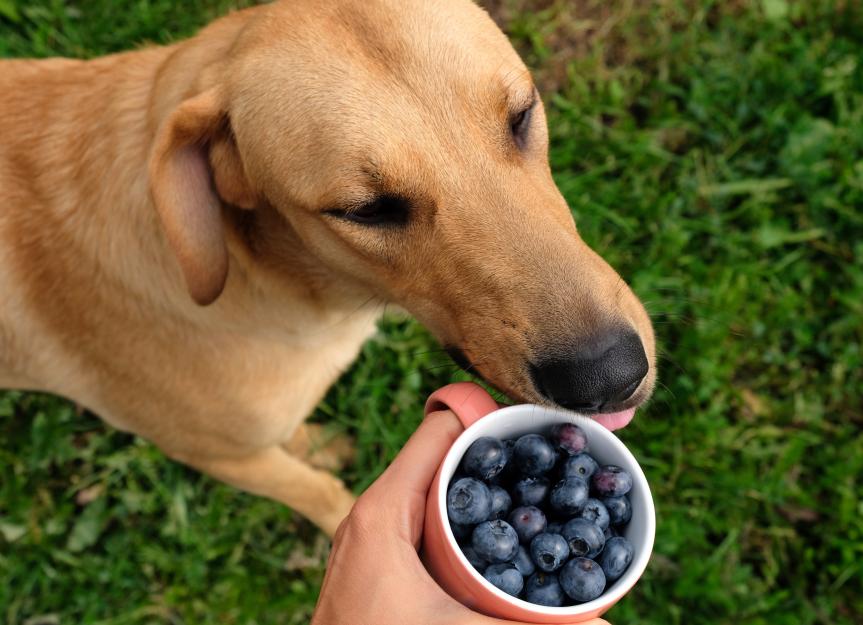Yes, dogs can eat blueberries. They are safe and even healthy for dogs.
Blueberries are low in calories and high in vitamins. Dogs love treats, and as pet owners, we want to give them the best. Blueberries are a tasty option that packs a nutritional punch. These tiny fruits are filled with vitamins, antioxidants, and fiber.
They can boost your dog’s health in various ways. But, how much should you give? Are there any risks? This post will explore everything you need to know about feeding blueberries to your furry friend. Let’s dive into the benefits and precautions to ensure your dog enjoys this treat safely.

Credit: www.reddit.com
Nutritional Value
Blueberries offer a range of nutritional benefits for dogs. They are small, tasty, and packed with essential nutrients. Let’s explore the nutritional value of blueberries for our canine friends.
Vitamins And Minerals
Blueberries are rich in vitamins and minerals. They contain vitamin C, which boosts the immune system. Vitamin K in blueberries supports bone health. These small fruits also have manganese, which helps in metabolism. Potassium in blueberries aids in muscle function. These vitamins and minerals make blueberries a healthy treat for dogs.
Antioxidants Benefits
Blueberries are high in antioxidants. These compounds fight free radicals in the body. Free radicals can cause cell damage. Antioxidants help reduce the risk of chronic diseases. Blueberries contain anthocyanins, a type of antioxidant. Anthocyanins give blueberries their blue color. They also have anti-inflammatory properties. This makes blueberries beneficial for dogs’ overall health.

Credit: www.dutch.com
Safety Considerations
Dogs can eat blueberries, but always check for allergies first. Offer them in moderation to avoid digestive upset. Fresh, organic blueberries are the safest option.
### Safety Considerations When giving your dog blueberries, it’s essential to keep safety in mind. While these berries are a nutritious treat, improper feeding can lead to issues. Let’s dive into key safety aspects to ensure your furry friend can enjoy blueberries without any problems. ###Potential Risks
Dogs can sometimes choke on blueberries, especially if they are small or eat too quickly. Always supervise your dog while they are eating. Another concern is allergies. Although rare, some dogs might be allergic to blueberries. Watch for signs like itching, swelling, or difficulty breathing. Blueberries have natural sugars. While they are healthy, too many can upset your dog’s stomach. Keep an eye out for diarrhea or vomiting. ###Portion Control
Moderation is crucial. You don’t want to overfeed your dog with blueberries. A few berries a day can be a great snack. Think about your dog’s size. A small dog should eat fewer blueberries than a large dog. Adjust the amount accordingly. Consider using blueberries as a reward. This makes it easy to control portions and adds a fun element to your dog’s training. By keeping these safety considerations in mind, you can offer blueberries to your dog confidently. Have you tried giving your dog blueberries? What was their reaction?Health Benefits
Blueberries are not just a tasty treat for humans; they also offer a host of health benefits for our furry friends. If you’ve ever wondered whether dogs can eat blueberries, the answer is yes! These little berries can be a great addition to your dog’s diet, providing several nutritional advantages. Let’s dive into some of the key health benefits your dog can enjoy from eating blueberries.
Improved Digestion
Blueberries are packed with dietary fiber. This fiber can help regulate your dog’s digestive system, making bowel movements more regular.
Have you noticed your dog struggling with constipation or diarrhea? Adding blueberries to their meals might be a simple solution to improve their gut health.
Fiber also aids in nutrient absorption, ensuring your dog gets the most out of their food.
Skin And Coat Health
Blueberries are rich in antioxidants, particularly vitamin C and vitamin E. These antioxidants help fight free radicals that can damage your dog’s skin.
Does your dog’s coat look dull or flaky? Including blueberries in their diet can promote healthier skin and a shinier coat.
Antioxidants also support overall immune health, making your dog less prone to skin infections and irritations.
Have you tried giving your dog blueberries? What changes did you notice in their health and behavior? Sharing your experiences can help other dog owners make informed decisions about their pets’ diet.

Credit: www.petmd.com
Feeding Methods
Dogs can enjoy blueberries in various forms. Fresh and frozen blueberries offer different benefits. Let’s explore the best ways to feed blueberries to your furry friend.
Fresh Blueberries
Fresh blueberries are a healthy treat for dogs. They are rich in antioxidants and vitamins. Rinse them well to remove any pesticides. Give a few berries as a snack or mix them with dog food. Avoid giving too many to prevent stomach upset. Fresh blueberries are easy to serve and dogs love their juicy taste.
Frozen Blueberries
Frozen blueberries are another great option. They are perfect for hot days. Freeze them to create a refreshing treat. They can also be used in homemade dog treats. Frozen blueberries are easy to store and last longer. Be sure to give only a few at a time. This prevents your dog from eating too much and getting a brain freeze.
Signs Of Allergies
As pet owners, we always want to ensure that our furry friends are healthy and happy. While blueberries can be a tasty and nutritious treat for dogs, it’s essential to be aware of any allergic reactions that may occur. Recognizing the signs of allergies in your dog is crucial for their well-being. Let’s dive into the common symptoms and when you should contact your vet.
Common Symptoms
Allergic reactions in dogs can vary widely. Some common symptoms to watch for include:
- Itching and Scratching: If your dog starts scratching more than usual, it could be an allergic reaction.
- Red or Inflamed Skin: Check for any redness or swelling, especially around the face and paws.
- Gastrointestinal Issues: Vomiting, diarrhea, or excessive gas can be signs of a food allergy.
- Respiratory Problems: Watch for coughing, sneezing, or difficulty breathing.
When To Contact A Vet
It’s always better to be safe than sorry. If you notice any of the symptoms listed above, it’s time to evaluate the situation.
If your dog’s symptoms are mild, such as slight itching or minor redness, you might consider monitoring them closely.
However, if your dog shows signs of severe reactions like difficulty breathing, continuous vomiting, or swelling of the face, seek veterinary care immediately.
Trust your instincts. If something feels off, don’t hesitate to contact your vet. It’s always better to get a professional opinion.
Have you ever experienced a situation where your dog had an allergic reaction? How did you handle it? Share your experiences and tips in the comments below!
Alternative Treats
Dogs can safely enjoy blueberries as a healthy snack. These fruits offer vitamins and antioxidants, promoting overall canine health. Always serve them in moderation to avoid digestive issues.
When it comes to treating your furry friend, variety is key. Blueberries are a great choice, but it’s always good to mix things up with other healthy options. Let’s explore some alternative treats that your dog can enjoy.Other Fruits
Many fruits are safe for dogs and can make delicious snacks. Apples, for instance, are a crunchy delight. Just remember to remove the seeds and core. Bananas are another good option. They are packed with vitamins and minerals, but give them in moderation due to their high sugar content. Strawberries are also safe. They are sweet and can be a refreshing treat during hot days. Just be sure to wash them thoroughly.Vegetables For Dogs
Vegetables can be great for dogs too. Carrots are a popular choice. They are crunchy and good for your dog’s teeth. Green beans are low in calories but high in fiber. They can be a fantastic treat for dogs on a diet. Sweet potatoes are another excellent option. They are packed with vitamins and can be baked or steamed for a soft, tasty snack. Have you ever tried giving your dog cucumber slices? They are hydrating and low in calories, making them an ideal treat for a hot day. Next time you’re preparing a snack, consider sharing some of these healthy alternatives with your dog. What are your dog’s favorite treats? Share your experiences in the comments!Veterinarian Opinions
Many dog owners wonder if blueberries are safe for their pets. Veterinarians have shared their opinions on this topic. Understanding their insights can help you make an informed decision.
Expert Advice
Veterinarians agree that blueberries are safe for dogs. These small fruits are rich in vitamins and antioxidants. They can boost your dog’s health. Blueberries are low in calories, making them a healthy treat.
Experts suggest giving blueberries in moderation. Too many can cause digestive issues. Always wash the berries well. This removes any pesticides or chemicals. Fresh or frozen blueberries are best. Avoid any that are canned or sweetened.
Common Recommendations
Veterinarians recommend starting with small amounts. Watch for any allergic reactions. Symptoms can include itching or stomach upset. If your dog shows any signs, stop feeding blueberries immediately.
Use blueberries as a treat, not a meal replacement. They can be added to your dog’s regular food. You can also use them as training rewards. Always keep your veterinarian informed. They can provide advice based on your dog’s needs.
Diy Blueberry Treats
Blueberries are packed with antioxidants, vitamins, and fiber. They’re a healthy treat for dogs in moderation. Making DIY blueberry treats is a fun way to spoil your furry friend. These homemade goodies are easy to prepare. You control the ingredients, ensuring a healthy snack for your dog.
Recipes And Ideas
Start with simple frozen blueberry treats. Blend blueberries and plain yogurt. Pour the mixture into ice cube trays. Freeze until solid. Your dog will love these cool, refreshing snacks on hot days.
Bake some blueberry dog biscuits. Mix whole wheat flour, oats, and pureed blueberries. Add an egg and a bit of water to form a dough. Roll out the dough and cut into shapes. Bake at 350°F for 20-25 minutes. Let the biscuits cool before serving.
For a quick treat, mix blueberries with your dog’s regular food. This adds a burst of flavor and nutrition. Your dog will enjoy the sweet surprise.
Storage Tips
Store frozen blueberry treats in a sealed container in the freezer. They will stay fresh for several months.
Keep baked blueberry biscuits in an airtight container. Store them in a cool, dry place. They will last up to two weeks.
If you have extra blueberries, freeze them. Spread the berries on a baking sheet. Freeze them until solid. Then transfer to a freezer-safe bag. This prevents clumping and makes it easy to grab a few at a time.
Frequently Asked Questions
How Many Blueberries Can I Give My Dog?
You can give your dog 8-10 blueberries as a treat. Always supervise and ensure they’re given in moderation.
What Fruit Can’t Dogs Eat?
Dogs should not eat grapes, raisins, or cherries. These fruits can cause kidney failure or toxic reactions in dogs.
Which Berries Are Toxic To Dogs?
Holly berries, mistletoe berries, pokeberries, and juniper berries are toxic to dogs. They can cause vomiting, diarrhea, and abdominal pain. Always keep these berries away from your pets.
Which Fruits Are Good For Dogs?
Apples, blueberries, bananas, and strawberries are good for dogs. These fruits provide essential vitamins and antioxidants. Always remove seeds and cores.
Conclusion
Dogs can enjoy blueberries as a tasty, healthy treat. They provide vitamins and antioxidants. Always serve in moderation to avoid any issues. Wash berries well before feeding. Monitor your dog for any allergic reactions. Blueberries are a great addition to a balanced diet.
Treat your furry friend with these delicious berries today!
